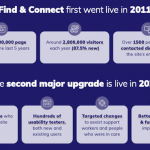Are we in an ‘Age of Inquiry’ into institutional child abuse?
- Nov 10, 2017
- In Features
The recently elected New Zealand government has committed to establishing an inquiry into the abuse of children in state care during its first 100 days of office. The Maori Women’s Welfare League is urging ministers setting up the inquiry to consult widely, including with victim and survivor groups and organisations with a history of involvement in state ‘care’. As they have stated, such consultation is essential to ensuring the inquiry leads to systemic change that will prevent abuse in the future.
The announcement of the New Zealand inquiry comes as the Royal Commission into Institutional Responses to Child Sexual Abuse draws to a close, making this a good time to consider the Royal Commission within the context of international abuse inquiries. It is one of the largest inquiries into child abuse ever conducted, comparable in significance to the Ryan Commission in Ireland, which lasted for over 9 years and took evidence from more than 1,500 people. The Ryan Commission is recognised as one of the most important inquiries into historical abuse globally. It was one of the first major investigations into past abuse of children in residential ‘care’ settings and it provided a model for subsequent inquiries, including the Australian Royal Commission.
Since the 1990s there have been inquiries into historical institutional child abuse in many countries. As well as the more complex question of why inquiries in different national contexts began to emerge at this time, there are many questions about this ‘inquiry trend’ that need to be answered. How many inquiries into the historical abuse of children have there been? What form have they taken? Are inquiries in other countries similar to the Royal Commission? And if not, how do they differ? What sorts of ‘abuse’ have they examined and in what kinds of ‘institutions’? Which countries have responded to survivors’ demands for justice by establishing inquiries and which countries have not? Have inquiries changed over time? And which inquiries, like the Royal Commission, have had a dual focus on both redressing past injustices for survivors and creating better futures for children?

These are the kinds of questions that The Age of Inquiry project is seeking to answer. Inspired by the Find & Connect web resource, we are mapping institutional child abuse inquiries with the aim of developing a comprehensive, publicly available online database of historical child abuse inquiries globally. This task is more complex than it may seem. Inquiry models differ, so our first challenge was to develop an approach to the generation of data that enabled comparison. Some inquiries are established as large legalistic investigations. Others are more like government initiated research programs. Some have examined all forms of abuse in particular institutional settings, while others have examined particular forms of abuse in all institutional settings.
Our project team developed categories that capture the key features of inquiries, including important dates, such as the historical period under investigation, when the inquiry was initiated and concluded, and when its final report was handed down. Information including detailed summaries of inquiries, their processes, findings and the recommendations they made, along with links to inquiry reports and other details are available on the website. In creating this web resource, our aim is to extend understandings of inquiries in the present and recent past by documenting and categorising their key features and for this information to be freely available for everyone.
The web resource is a work in progress. The inquiries listed now will expand as our research progresses. So far, we have a comprehensive list of Australian inquiries, along with a select number of inquiries from Canada, Denmark, Ireland, Norway, Sweden, the UK and the USA. The Age of Inquiry is a collaborative project that brings together researchers from Australia and Europe and actively encourages contributions from researchers with expertise in this field. We welcome feedback or suggestions.
It is clear from our research and from other work in the growing field of inquiries, apologies and redress that inquiries have been an important part of a global movement of survivors seeking justice and redress. What is also clear is that inquiries into institutional child abuse are complex. They have multiple functions and a range of effects. Their primary purpose, however, is to provide justice for victims and to make institutions safer places in the future. This is the challenge New Zealand is now taking up through their inquiry. Here in Australia, our challenge in the wake of the Royal Commission is to ensure that its recommendations are put into effect and that the issue of child safety is kept on the national agenda.
Author
Katie Wright is a Senior Lecturer in Sociology at La Trobe University. If you would like more information about the ‘Age of Inquiry’ you can email katie.wright@latrobe.edu.au






Rodney Day
November 13, 2017 7:11 amGold card. Would be very helpful the pain never goes away it would help us.